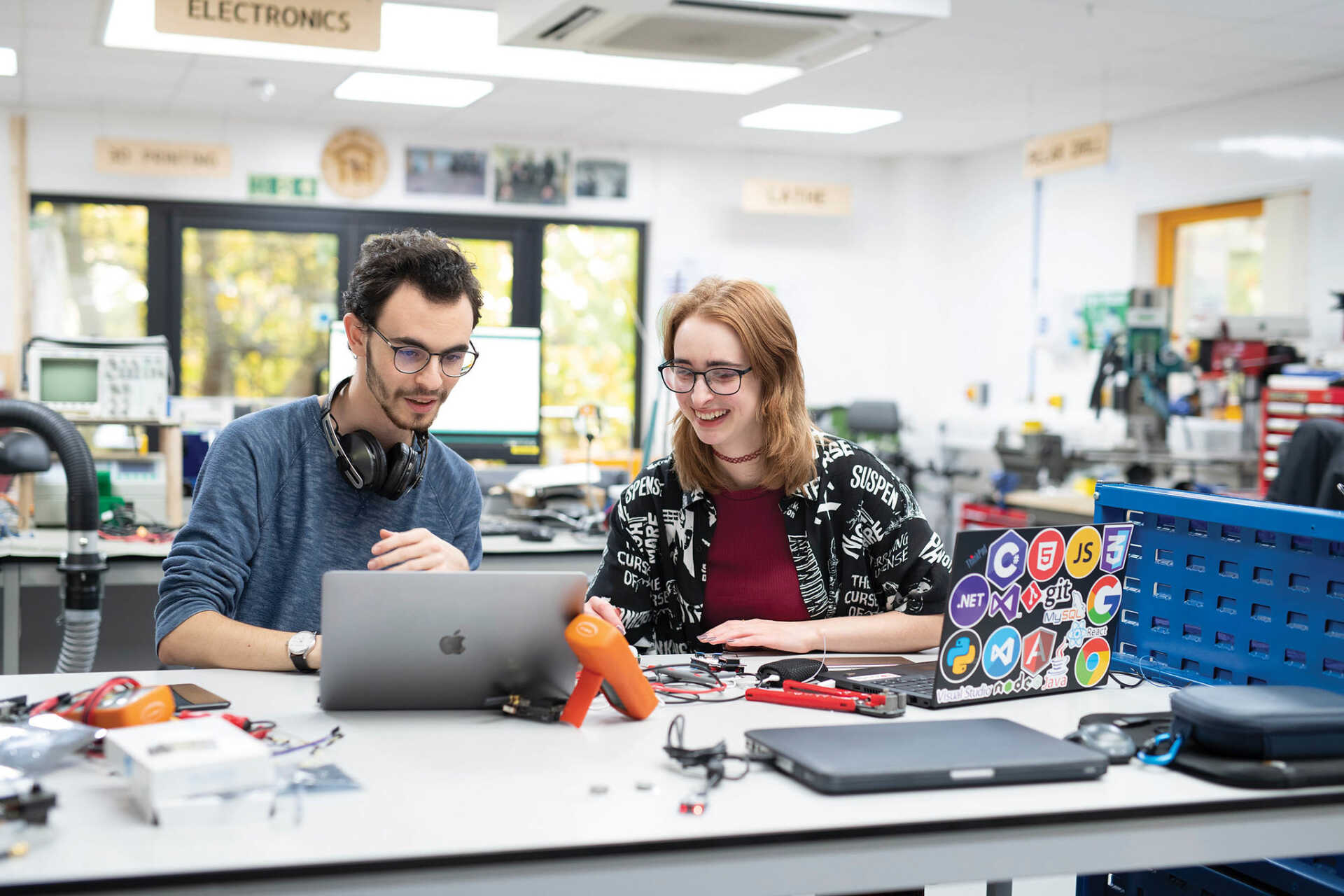Business Information Technology
Combine expertise from the School of Computing and Kent Business School to start your journey to a well paid career.

Combine expertise from the School of Computing and Kent Business School to start your journey to a well paid career.
Business increasingly takes place in digital spaces. This degree gives you the skills you need to apply computing knowledge to areas typically found in business such as e-commerce, information systems and computer consultancy.
Business and commerce need a skilled workforce who understand the foundations of information technology and the principles of business practice. This degree provides a balance of business and information technology and responds to industry needs, enhancing your employment prospects.
We're accredited by BCS, The Chartered Institute for IT.

"The School of Computing manages everything to do with the year in industry, and how much support they give you."
Accredited by BCS, The Chartered Institute for IT

Choose to add an industry placement, giving you work experience, a salary and the chance to secure a job with the same company after graduation.
Informed by stakeholder panel of industry experts who give feedback on the skills employers need from a modern workforce.

You’ll have access to a laser cutter, metal fabrication machinery and development equipment.
Our typical offer levels are listed below and include indicative contextual offers. If you hold alternative qualifications just get in touch and we'll be glad to discuss these with you.
BBB
Distinction, Distinction, Merit
120 tariff points from your IB Diploma, including Maths at 4 at HL or SL, typically H5, H6, H6 or equivalent
Mathematics grade C/4
Pass the University of Kent International Foundation Programme.
The University will consider applicants holding T level qualifications in subjects closely aligned to the course.
Obtain the Access to HE Diploma with a minimum of 45 credits at Level 3, with 24 credits at Distinction and 21 credits at Merit.
What are the foundational principles and practices that all programmers need to know? Designed for beginners and assuming no experience, this module equips you with essential programming concepts and skills.
The module is a blend of theoretical instruction and hands-on exercises with the Python programming language. The skills you acquire will help you learn other programming languages such as Java and C++, to name a few.
Practical assignments and projects enable you to apply and hone your skills. Additionally, you'll learn basic debugging techniques and best practices in coding style and documentation. By the end of the module, you’ll emerge with a solid understanding of programming fundamentals, laying the groundwork for further exploration and mastery in the field of computer science.
Our lives are completely dependent on the correct operation of software: healthcare systems, banking and university student data systems, to name just a few, are all dependent on it. Writing code is relatively easy, but writing code accurately and well requires the ability to solve problems and understand how the code we write is often just a small part of a bigger system.
In this module, you’ll learn how an object-oriented approach to software development allows us to think in a particular way about solving problems. This approach increases the likelihood that our code will be well-written and reliable.
You'll also learn about abstraction and inheritance and develop a deeper practical understanding of how to program beyond simple problems.
We use large-scale web applications every day in our lives. How much do we understand about how they are structured and deployed, and how they operate? Web development technologies and frameworks change every year, while new ones are constantly proposed. As web developers, how do we cut through the marketing hype to evaluate what these really provide?
In this module you’ll examine the fundamental technologies that make modern web applications work. You’ll learn to use operating and cloud systems to deploy, configure, and monitor software. You’ll dive into networking, from the basic principles of network latency and bandwidth to addressing and transmitting at different layers, from the datalink to the HTTP application layer. You’ll also develop a foundational frontend web development skill set, learning how to structure web pages using HTML, style them using CSS, and develop interactive web pages using JavaScript.
Finally, you’ll develop an appreciation of web application architecture, from the web server to the most popular web stack frameworks. You’ll learn their principles of operation and practise their deployment on the cloud at different levels of abstraction.
We use a variety of physical, digital, and virtual interfaces every day. How many of these do we find easy, effortless, and pleasurable to use? How many of these do we find frustrating to use?
Some interfaces are well designed and provide a good user experience, but many are poorly designed. Throughout this module, you will learn about design quality and the need for a professional, integrated, and user-centred approach to interface design and development.
You’ll explore various analysis and design methods, understand what good interaction design is, and learn how to design easy to use, effective, and efficient interfaces. You’ll learn about different design principles and how to apply these principles to optimise the interaction between humans and computers. You’ll master the fundamental skills of user experience (UX) design and develop the ability to analyse designs and spot usability problems.
Mathematical reasoning underpins most aspects of computer science. Knowing and understanding the mathematical methods, techniques and abstract reasoning skills required to solve problems and analyse data is vital for moving on to other modules in our computing degree courses.
This module demonstrates the role of mathematics in Computer Science with relevant examples. Starting with algebra, reasoning and proof, set theory, functions, statistics and computer arithmetic, you’ll progress to the more abstract topics of matrices, vectors, differential calculus and probability.
How do companies measure, assess and communicate their financial performance? Managers prepare, read and interpret financial information daily and they use it to communicate company financial results to a variety of stakeholders.
In this module you’ll learn how sole traders and limited companies record accounting transactions using bookkeeping and how they summarise and report their financial results to external stakeholders using financial statements. You’ll also gain essential knowledge of the regulatory framework of financial reporting which guides the process of preparing annual reports for a variety of companies.
By the end of the module, you will have developed the analytical skills needed to both prepare and analyse financial statements. This will enable you to holistically assess company financial performance and provide recommendations, an important skill in your future career.

It was a change to work in the real world, and I think it helps you to see what you want in life.Eleana Sklaveniti, Computer Science with a Year in Industry - BSc (Hons)
Database systems are a cornerstone of most software. The contact list of your phone is managed by a database, as are the custom-made applications used by small and midsized enterprises, as well as the large-scale databases of internet platforms with their billions of users.
This module introduces you to the theory and practice of database systems. You’ll model, design, implement, and use database systems, gaining valuable skills you will need in your career as a software developer.
By the end of the module, you’ll be able to use query languages, emerging techniques, and future technologies in the field of database systems.
Embark on a transformative journey into the dynamic world of web development with this intermediate module covering internet technologies.
Designed to empower aspiring developers with the skills needed to thrive in today's digital landscape, this module offers a deep dive into the foundations of both front-end and back-end web development. From crafting captivating user experiences with the latest browser technologies to mastering server-side programming, databases and sound design principles, the curriculum equips you with the proficiency to build robust and scalable web applications. Join us and unlock the keys to shaping the future of the internet.
By the end of the module, you’ll become a proficient full-stack developer poised for success in the ever-evolving tech industry.
Software is everywhere you look, and modern software systems need to adapt to changes quickly. Software teams release new versions of their software frequently to keep up with changing requirements.
You will learn about the best practices for developing such software within a team using the agile methodology. You’ll discover the importance of customer involvement for identifying requirements, writing automated tests for verifying functionality, and code reviews for improving the quality of the codebase. You’ll also work with your peers to develop a software product incrementally.
As you embark on your project, you’ll apply the principles of agile methodology, manage your team effectively, organise your code using version control, and resolve problems via issue tracking. Further skills you’ll develop include learning to identify risks for software projects and following the principles of ethical software development to develop products to the highest professional standards.
This module aims to equip you with the knowledge and skills to identify, analyse, and evaluate ethical issues in business. Through critical reflection and analytical argumentation, you’ll develop the ability to articulate your views and critique opposing perspectives on ethical matters.
The focus of this module is on gaining an in-depth understanding of business ethics and cultivating critical thinking skills, enabling you to emerge as a conscientious leader in your field. Corporate social responsibility and sustainability are central themes due to the growing interest and expectations from stakeholders on environmental and social performance.
You'll cover essential theories such as utilitarianism, deontological theories, corporate social responsibility, and the triple bottom line, applying these concepts to real-life business situations through case studies.
Operations management is the highly important activity of managing the resources devoted to production and delivery of products and services.
We'll explore conceptual, analytical, and practical aspects of how to effectively manage operations in manufacturing and service companies. We’ll look at various types of businesses including in the private, public, and third sector as well as start-up organisations.
You’ll develop highly sought after knowledge, understanding, skills and abilities in analysing, judging and decision-making in these areas. All of these will be very valuable when starting out in your career.
Project management has rapidly emerged as an essential discipline for businesses seeking to achieve strategic and sustainable goals. It can be applied across industries, offering indispensable tools for organisational development. Whatever field you are working in, project managers are in the driving seat of progress.
This module provides in-depth insights into project management concepts, principles, and applications, giving you essential approaches, tools, and techniques which you can apply to various contexts.
You’ll enhance your analytical, critical and reflective thinking skills. By integrating project management expertise with discipline-specific knowledge, you’ll have a competitive edge when you finish the module, enabling you to succeed in both project and non-project-oriented careers.
Are you interested in starting your own business? What are the tools and skills you need to do so? Why are startups becoming more popular? We’ll delve into the social and economic changes that have raised the status of enterprises, small businesses, and entrepreneurial ventures in the global economy.
We’ll consider entrepreneurs, their characteristics and motivations, and the barriers and issues that they face when planning and establishing a new startup venture. You'll learn what makes new ventures grow and succeed, and evaluate the practical decisions that entrepreneurs need to make to maximise the chances of their business succeeding.
Engaging in group projects is a crucial aspect of your computer science studies as it provides you with valuable opportunities to work collaboratively with your peers. In the field of software development, teamwork is indispensable for achieving success as most projects require the combined effort of multiple individuals with diverse skills and expertise.
By participating in group projects, you not only enhance your technical knowledge but also develop essential teamwork skills such as communication, problem-solving, and collaboration. These skills are highly sought after in the industry and will undoubtedly set you apart as a successful and well-rounded computer professional. Embrace the opportunity to work in teams and take full advantage of the learning and growth experiences that come with it.
We live our lives in a digital and highly networked world. Most (if not all) modern organisations rely on computers, the internet, cloud services or other digital devices and systems to manage their data, processes, workforce and other assets. How can organisations manage the security of their data, systems, processes and other assets?
You’ll gain a systematic understanding of information security management, such as what standard processes and practices to follow and how to assess and manage risks. You’ll also learn how to manage AAA (authentication, authorisation and accountability), how to understand the complicated cyber law landscape to ensure legal compliance, how to ensure security controls and processes are usable for all, and how to foster a people-centric culture for information security among staff.
By the end of the module you’ll have the necessary skills needed for becoming a confident and well-informed information security manager at any organisation you choose to work for.
In the rapidly evolving world of business, developing and implementing effective strategies is vital for success. This module equips you with the knowledge and skills necessary to excel in the field of strategic management.
You’ll engage in rigorous analysis and critical thinking to explore a range of strategic concepts. These include the fundamentals of strategic planning, advanced topics in supply chain dynamics, and issues such as quality management, technology-driven innovation, and project/event management.
Throughout the module, you’ll engage in interactive discussions, group projects, case studies, and hands-on exercises to enhance your problem-solving and decision-making skills. By the end, you’ll have the ability to analyse and apply critical thinking to evaluate strategic alternatives and make informed recommendations.
What are the key policies and practices that shape how we manage people in organisations? You'll learn about all areas of human resource management theory and practice — from planning and recruiting for your human resource requirements through to effective performance and reward management, employee relations and the ethical treatment of staff.
By the end of the module, you will have increased your awareness and developed your knowledge and skills in effective management by looking at practices currently applied within organisations. This skill set is crucial as you progress in your career in HR management through this module, you should have everything you need to thrive in your career.
In a world marked by perpetual transformation, how can emerging leaders adeptly navigate the challenges and seize the opportunities that shape corporate strategies? Through engaging and interactive sessions, students will unravel the complexities inherent in leadership principles and strategic decision-making. Hands-on applications are used, ensuring that, alongside the theoretical knowledge, you develop the practical skills essential for effective leadership in the contemporary business environment. You will leave the module with a knowledge of corporate strategy tools that are indispensable resources utilized by organisations to navigate the intricate landscape of strategic decision-making and planning.
The law expects businesses to be governed responsibly and individuals within them to be mindful as to how they fulfil their legal obligations to their customers, the environment, their workforce and the public. You'll study negligence, company, employment and discrimination law, emphasizing responsible business governance and individual accountability. By analysing current legal issues and applying them to real-world scenarios, you'll enhance problem-solving skills, understanding of diverse impacts and ethical decision-making in business. Navigating complexities and ambiguities fosters critical thinking and integrity, preparing you for future studies and careers.
How do you think creatively for business and startup planning? You'll address opportunity recognition, product development, business proposal creation and entrepreneurial finance. Through teamwork, you'll develop leadership, problem-solving, communication and analytical skills. Analogies from diverse cultures aid personal connections, while the curriculum emphasises sustainability, lifelong learning and systems thinking. You'll gain entrepreneurial confidence, adaptability, opportunity recognition, risk management, and innovative mindset for diverse career paths.
Over the past few decades, video games have evolved into a mature digital medium, influenced by and driving advancements in GPU technology and AI. The commercial success of video games has spurred the accessibility of sensor technologies, leading to the rise of immersive technologies like virtual reality, paving the way for spatial computing.
Given the significance of video games in popular culture and the cutting-edge technological advancements, delve into this video game module, where you will learn various facets within video game design and development, encompassing game physics, AI, level design, player behaviour, game rules and mechanics, and user interfaces.
Through hands-on instruction, you are introduced to game development utilising state-of-the-art game engine. Additionally, you will extend the application of these skills in designing immersive and spatial computing applications, so you have all the tools you need to break into an exciting and expanding industry.
This module underscores the critical role of computing law and professional responsibility in raising ethical, legal, and responsible practices within the field of computing and technology.
You will delve into how computing law in the digital age, where data is ubiquitous, the importance of privacy and security cannot be overstated. You will learn how the General Data Protection Regulation (GDPR), plays a vital role in dictating the way personal data is collected, processed, and safeguarded, thereby preventing unauthorised exploitation, misuse, and security breaches.
You’ll gain knowledge on how ethical and legal standards engenders trust and confidence among users, stakeholders, and the broader public. Critically analysing ethical principles, legal mandates. You will delve into how prioritising the welfare of individuals and society at large, the computing sector can realise its potential as a catalyst for beneficial transformation and innovation.
Computational Intelligence (CI) techniques are essential to solve many of the real-world problems found in today’s data-driven decision making, where traditional analytical methods fall short due their complexity.
You will learn the fundamental concepts in CI, exploring how CI algorithms can efficiently navigate solution spaces to find (near) optimal solutions to complex problems. You will develop skills in applying Genetic Algorithms and Genetic Programming to solve complex problems in Business, Economics, and Finance through hands-on exercises and case studies.
You will learn to identify and analyse problem domains suitable for Genetic Algorithms and Genetic Programming, as well as how to implement and evaluate these algorithms effectively. This experience and the skills you develop help you stand out to employers and gain an extra edge in launching your career.
Our contemporary world is inundated with an ever-expanding pool of digital data such as signals and images, and there seems to be no limit to our insatiable appetite for collecting even more information. Navigating through this vast sea of data, rife with noise and extraneous information, poses a formidable challenge in distilling meaningful insights.
You will master the foundational principles underlying signal, image and other types of data across diverse domains, including but not limited to acoustics, medicine, and finance. Skills required to adeptly organise, cleanse, visualise, and analyse intricate datasets will be taught, thereby allowing you to extract valuable and actionable information. Both classical and cutting-edge data analysis techniques will be explored, incorporating traditional methods alongside advanced approaches such as neural network-based deep learning.
Through immersive hands-on applications, you will actively tackle real-world data analysis challenges in weekly classes, fostering a practical and nuanced comprehension of the subject matter taught in lectures. The emphasis will be on ‘how’? i.e. to implement the methods by leveraging a data analytics tool, minimising the need for rote memorisation of theory. This practical approach ensures that you are well-equipped to navigate the ever-evolving terrain of data science, preparing you for the demands of the professional realm.
You’ll explore cognitive robotics, a branch of robotics in which knowledge plays a central role in supporting action selection, planning, and execution. Through this exploration, you’ll gain an understanding of what is involved in the design of a cognitive robot. You will master the knowledge and skills to produce working implementations for simple instances of tasks with a range of robots in the Cognitive Robotics lab.
Whether or not you have previous background in robotics, you will become familiar with core areas in robotics and principles of robotic programming, by engaging in interactive practical activities with real mobile robots and virtual simulators. You will be introduced to common software development environments to operate mobile robots in navigating a physical and virtual map or to manipulate simple objects.
You will be exposed to different applications of the state-of-the-art in Cognitive Robotics, such as industrial robots, collaborative robots, and human-robot interaction. You will learn about recent challenges in robotic vision and how robots can use and understand human language. You will explore the societal impact of Socially Assistive Robots and their interaction with humans, emphasising why the body of a social robot plays a significant role in enhancing such interactions, compared to traditional computer-based virtual agents.
You’ll explore the cutting-edge technologies used in the delivery of healthcare, from wearable devices and sensors for data collection, to digital platforms used in hospitals and care environments. You will understand the use of information technology for handling clinical data in health systems and learn different and exciting ways in which clinicians use historical and present test data to identify the best outcome for their patients.
You will explore some basic principles of machine learning algorithms for analysing medical data and learn how to create a start-up in health care domains, from proposing an innovative idea for an eHealth product and seeking funding opportunities for it, to planning the project of producing and marketing this new product.
Do you want to bring your passion for computing to the classroom? If so, this module is for you. Through spending one half-day per week in a school with a nominated teacher, you’ll gain an authentic experience of working in a school classroom. Observing sessions taught by experienced teachers provides you with insights into the classroom experience and professional attributes required for such work.
Acting in the role of a teaching assistant, by helping individual pupils who are having difficulties or by working with small groups, you can begin to acquire some of the interpersonal and presentation skills required in a teaching role. Devising a special project in consultation with the teacher and the module team deepens your understanding by providing an opportunity to put these skills into practice.
What does it mean for a computer to be creative? How can artificial intelligence be used to generate creative behaviour? How do we work around the social, ethical and philosophical issues that arise?
You’ll learn about key theoretical, practical and philosophical research and issues around computational creativity and creative AI. You'll explore what computational creativity is and consider examples in different creative domains. You’ll gain practical experience in writing creative AI software. You’ll also tackle how to evaluate the creativity of creative computer systems and consider contextual issues around how computational creativity and creative AI can be used.
Student-led seminars allow you to develop knowledge by reading about, discussing and reflecting on current issues under debate in the area. You'll identify a specific context to focus on in more depth and, in your chosen context, you will conceptualise, design, build and evaluate your own creative AI software.
Data mining and knowledge discovery techniques are widely used in real-world applications. Examples of high-stakes applications include analysing data to decide whether or not a patient should undergo a surgery or a customer should be granted a loan or hired for a job. You’ll learn in detail how data mining algorithms work to automatically extract knowledge from data, and why these algorithms – which are based mainly on machine learning (but also on statistics) – are so important for today’s data-driven society.
You’ll learn about the broader process of knowledge discovery, including the application of data mining algorithms to real-world datasets. You’ll also prepare data for the subsequent application of a data mining algorithm and learn how to evaluate the knowledge discovered by a data mining algorithm. This module emphasises the use of techniques that learn predictive models that can be in principle interpreted by users, as opposed to machine learning techniques that learn black-box predictive models (not directly interpretable by users).
Computing-specific and business related skills are acquired through lectures, classes and directed study. From the start of the course, students receive guidance and gain practical experience via various styles of supervised practical classes and directed study. As the course progresses, these skills are further encouraged by the introduction of larger-scale problems and project work. Students develop critical reflection by discussing key themes introduced in the core modules.
We provide excellent support for you throughout your time at Kent. This includes access to web-based information systems, podcasts and web forums for students who can benefit from extra help. We use innovative teaching methodologies, including BlueJ and LEGO© Mindstorms for teaching Java programming.
Our staff have written internationally acclaimed textbooks for learning programming, which have been translated into eight languages and are used worldwide.
For a student studying full time, each academic year of the programme will comprise 1200 learning hours which include both direct contact hours and private study hours. The precise breakdown of hours will be subject dependent and will vary according to modules.
Methods of assessment will vary according to subject specialism and individual modules.
Please refer to the individual module details under Course Structure.
For course aims and learning outcomes please see the course specification.

You'll be on course for a big future. Graduates who have both IT knowledge and business skills can expect excellent career prospects. Our graduates have gone on to work in:
Recent graduates have gone on to develop successful careers at leading companies such as:

The only chance of me pursuing my career of choice was to find a great University that offered an industrial placement year.

*The Government announced on 4 November 2024 that tuition fees in England for Home students will increase to £9,535 from £9,250 for the academic year 2025/26. This increase requires Parliamentary approval, which is expected to be given in early/mid 2025.
Tuition fees may be increased in the second and subsequent years of your course. Detailed information on possible future increases in tuition fees is contained in the Tuition Fees Increase Policy.
The University will assess your fee status as part of the application process. If you are uncertain about your fee status you may wish to seek advice from UKCISA before applying.
For details of when and how to pay fees and charges, please see our Student Finance Guide.
Students will require regular access to a desktop computer/laptop with an internet connection to use the University of Kent’s online resources and systems. Please see information about the minimum computer requirements for study.
Find out more about accommodation and living costs, plus general additional costs that you may pay when studying at Kent.
Kent offers generous financial support schemes to assist eligible undergraduate students during their studies. See our funding page for more details.

We have a range of subject-specific awards and scholarships for academic, sporting and musical achievement.
We welcome applications from students all around the world with a wide range of international qualifications.

Student Life

Powered by progress
Kent has climbed 12 places to reach the top 40 in The Times Good University Guide 2025.
Kent Sport
Kent has risen 11 places in THE’s REF 2021 ranking, confirming us as a leading research university.

An unmissable part of your student experience.